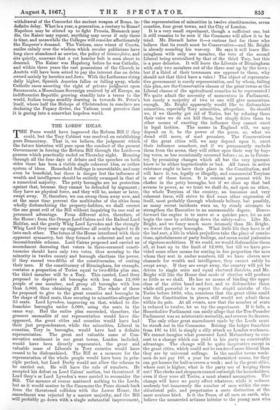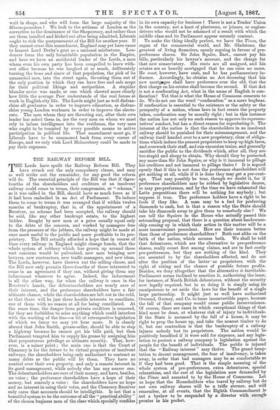THE LORDS' IDEAS. HE Peers would have improved the Reform
Bill if they could, but the Tory Cabinet was resolved on establishing pure Democracy. That is, we believe, the judgment which the future historian will pass upon the conduct of the present Government in forcing the Reform Bill through the Lords—a process which practically ended on Thursday night. Running through all the four days of debate and the speeches on both -sides there has been a visible single coherent idea, or rather :system of ideas. Household Suffrage is unavoidable, and may even be beneficial, but there is danger lest the influence of wealth and intelligence should be entirely swamped in that of a numerical majority. The petty boroughs are no protection Against that, because they cannot be defended by argument ; they have no physical force, and they will be, sooner or later, swept away. If, therefore, we can sweep them away now, and .at the same time prevent the multitudes of the cities from wholly disfranchising the property-holders, we shall correct the one great evil of the Bill without impairing its one real or presumed advantage. From different sides, therefore, of the House ; from the Orange Lord Cairns and the Radical Lord Halifax, and the gently Whig Lord Lyveden and the strongly 'Whig Lord Grey came up suggestions all neatly adapted to fit into each other. The forms of the House interfered with their .apparent symmetry, but they formed a coherent and not an inconsiderable scheme. Lord Cairns proposed and carried an -amendment decreeing that voters in three-cornered consti- tuencies should have only two votes, thus securing to the minority in twelve county and borough elections the power, 51 they exceed two-fifths of the constituencies, of seating their man. If the constituency of Birmingham, for example, contains a proportion of Tories equal to two-fifths plus one, the third member will be a Tory. This carried, Lord Grey proposed to deprive all boroughs with less than 12,000 people of one member, and group all boroughs with less than 5,000, thus obtaining 23 seats. The whole of these he proposed to give to the great counties and boroughs in The shape of third seats, thus securing to minorities altogether S5 seats. Lord Lyveden, improving on that, wished to dis- franchise boroughs under 5,000, using the seats in the same way. Had the entire plan succeeded, therefore, the grossest anomalies of our representation would have dis- appeared, the great cities and counties would have had their just preponderance, while the minorities, Liberal in counties, Tory in boroughs, would have had a definite representation. The great and valuable• mass of Con- servative sentiment in our great towns, London included, would have been directly represented, the great and -valuable mass of Liberals in Tory counties would have ceased to be disfranchised. The Bill as a measure for the representation of the whole people would have been in pin- Ciple perfect, but Lord Derby would not allow the scheme to be Carried out. He will have the rule of numbers. He .accepted his defeat on Lord Cairns' motion, but threatened if lord Grey's or Lord Lyveden's were carried to reconsider the Bill. The menace of course mattered nothing to the Lords, but as it would matter to the Commons the Peers shrank back from the threatened collision with the Lower House, the .amendment was rejected by a narrow majority, and the Bill will probably go down with a single substantial improvement, the representation of minorities in twelve cOnstituencies, seven counties, four great towns, and the City of London. It is a very small experiment, though a sufficient one, but it still remains to be seen if the Commons will allow it to be tried. Mr. Disraeli hates it—a curious fact for those who believe that its result must be Conservative—and Mr. Bright is already sounding his war-cry. He says it will leave Bir- mingham with only one member, the vote of the second Liberal being neutralized by that of the third Tory, but this is a pure delusion. It will leave the Liberals of Birmingham with only two members out of thu three sent up by the town ; but if a third of their townsmen are opposed to them, why should not that third have a voice ? The object of representa- tive government is surely representation, and by whom, failing this plan, are the Conservative classes of the great towns or the Liberal classes of the agricultural counties to be represented ? We quite admit the necessity of momentum in Parliament, but surely a majority of two to one will give momentum enough. Mr. Bright apparently would like to disfranchise minorities, especially Tory minorities, altogether. So should we, if we thereby got rid of Tories, but by refusing them their voice we do not kill them, but simply chive them to other means of exerting the influence they cannot exert in legal fashion. The means in England will, we may depend on it, be the power of the purse, or, what we dread still more, of mad promises. The Conservatives of the great cities will, we may depend upon it, exert their influence somehow, and if we permanently exclude them from the arena, they will either open their way by buy- ing votes, as has occasionally occurred before ; or, as in Coven- try, by promising changes which all but the very ignorant know to be either impracticable or bad. All forces in active existence ought to have their place in the Constitution, and will have it, too, legally or illegally, and commercial Toryism is one of those forces. It is content at present with its chance in the petty boroughs, but if we close up that bad avenue to power, as we trust we shall do, and open no other, the whole Toryism of the country, an immense and very coherent force, will strive to find some other expression .of itself, most probably through wholesale bribery, but possibly, as many recent incidents warn us, by steady attempts to strengthen the Executive to an unreasonable degree. Hence- forward the engine is to move at a quicker pace, let us not begin the race by soldering down the safety-valve. Like Mr. Bright, and we fancy much more intensely than Mr. Bright, we detest the petty boroughs. What little life they have is of the bad sort, a life in which prejudices take the place of convic- tions, spitefulnesses of party feelings, and mean social jealousies of vigorous ambitions. If we could, we would disfranchise them all, at least up to the limit of 12,000, but till we have pro- vided some other means for seating in due proportion the men whom they seat in undue numbers, till we have cloven new channels for wealth and intelligence, they cannot safely be swept away. If they are swept away, the country will yet be driven to single seats and equal electoral districts, and Mr. Bright will like the House that mode of election will produce as little as we shall. He has no means of binding the upper class of the cities hand and foot, and to disfranchise them while still powerful is to repeat the stupid mistake of the Tories before 1830, who, conscious that the great cities could tear the Constitution in pieces, still would not admit them within its pale. At all events, now that the number of seats is reduced to twelve, let us try the experiment. If it fails, a. Householder Parliament can easily allege that the Ten-Pounder Parliament was an aristocratic assembly, and reverse its decrees.
The only other great amendment made by the Lords must be struck out in the Commons. Raising the lodger franchise from 10/. to 15/. is simply a silly attack on London workmen. We cannot imagine what possessed Lord Malmesbury to con- sent to a change which can yield to his party no conceivable advantage. The change will be quite inoperative except in the great cities, which could not be rendered more liberal than they are by universal suffrage. In the smaller towns work- men do not pay 10/. a year for unfurnished rooms, for they can get houses for half-a-crown a week ; and in the great cities, where rent is higher, what is the party use of keeping them out? The clerks and shopmen cannot outweigh the householders, even if they were all Tories, a most absurd assumption. The change will have no party effect whatever, while it reduces uselessly but immensely the number of men within the con- stitutional pale, and perpetuates a caste distinction of the most noxious kind. Is it the Peers, of all men on earth, who believe the unmarried artizans inferior to the young men who wait in shops, and who will form the large majority of the fifteen-pounders ? We look to the artizans of London as the corrective to the dominance of the Shopocracy, and rather than see them insulted and kicked out after being admitted, Liberals ought to risk the postponement of the Bill for another year. If they cannot erase this amendment, England may yet have cause to lament Lord Derby's gout as a national misfortune. Lon- doners form the only formidable population in the Empire, and here we have an accidental leader of the Lords, a man whom even his own party has been compelled to leave with- out office because he was laughed at so much, deliberately turning the bone and sinew of that population, the pick of its unmarried men, into the street again, thrusting them out of the only position in which they can have free and safe scope for their political likings and antipathies. A stupider blunder never was made, or one which showed more clearly how little the average Peer understands of the real forces at work in English city life. The Lords might just as well disfran- chise all graduates in order to improve education, as disfran- chise young London workmen in order to improve the electo- rate. The men whom they are thrusting out, after their own leader has asked them in, are the very men on whom we most rely to infuse intelligence into the residuum, the very men who ought to be tempted by every possible means to active participation in political life. That amendment must go, if Liberals have to be summoned back from every corner of Europe, and we only wish Lord Mahnesbury could be made to pay their expenses.































 Previous page
Previous page